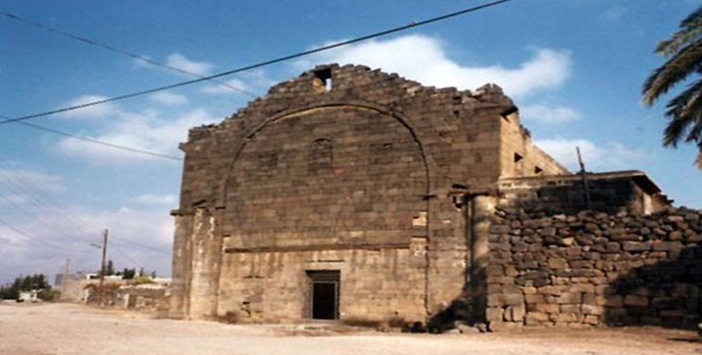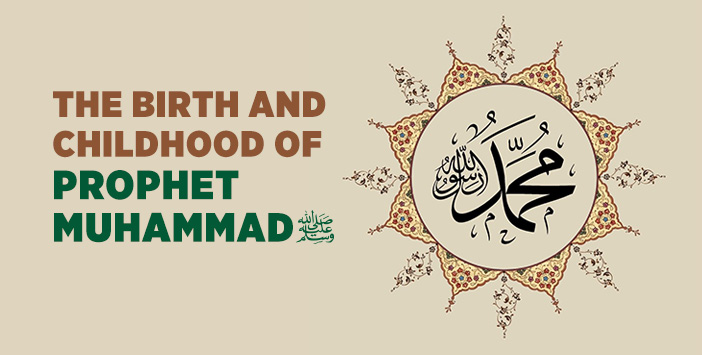What did Christian Monk Bahira do when saw the young Muhammad? What Monk Bahira did he say to the uncle of the prophet? Prophet Muhammad and Chrıstıan Monk Bahırah…
During his trip to Syria with his uncle Abu Talib, the caravan camped near the monastery of Bahirah, a Christian monk. Astounded at having noticed a cloud hovering around the caravan and shading a certain person, as well as the branches of trees leaning forth to shelter someone from the sun near where the caravan had camped, the curious Bahirah decided to look in to the intriguing matter and invite the Meccans inside the monastery for some food:
“I have prepared food for you all. I insist each and every member of the caravan to join, young and old, free and slave.”
The Meccans were taken aback by the invitation of Bahirah, since he had never seemed to take much interest in them before, during their numerous other trips to Syria. Nevertheless, everyone heeded the invitation. Inquisitively staring at all the faces of his guests upon their entrance, Bahirah felt he did not find whay he had been looking for, a certain sign he wished to see.
“Did you leave someone behind?” he asked.
“No one”, they said, “except for a child left to keep an eye on the caravan and their belongings, chosen for the job since he was the youngest.”
But Bahirah insisted he come for the meal as well. Once brought by the table, Bahirah recognized Muhammad -upon him blessings and peace- immediately. Taking him by the hand, he murmured:
“This is the Master of the Both Worlds…The Almighty’s Messenger, the Mercy of the Worlds!”
The Meccan elders asked him where he had gotten such an idea, to which Bahirah answered:
“I read his signs from our Holy Scriptures. As you approached, I noticed all trees and rocks bowing to him in respect. I am aware that it is only to prophets that these inanimate things bow in respect. I then became all the more convinced, once I looked further and noticed the his seal of prophethood between his shoulder blades.”
Bahîrah then continued to pose more questions to Abu Talib about his young nephew and each answer he received set his heart at greater ease regarding his premonition. Bahirah was now certain about the child’s prophethood.
“Take your nephew back to your homeland!” he then urged Abu Talib. “Beware of the harm that may come from the Jews, for God forbid if they recognize your nephew, they will most certainly try to kill him. The Jews desire the next prophet to be raised from among them, from the children of Israel, yet this child is an Arab. Take him back…Awaiting him is a great future.”
Abu Talib listened to the advice of Bahirah and immediately turned back to Mecca, at the expense of cutting his business venture short. (Ibn Ishâq, p. 54-55; Ibn Saad, I, 153-155; Tirmidhî, Manâqıb, 3)
Some orientalists have exploited this incident in alleging that the Prophet -upon him blessings and peace- received all the vital information from Bahirah to establish his own religion; an unfounded accusation indeed. Bahirah, after all, was a Christian monk and the beliefs communicated in the textually corrupted Bible are contrary to the core of Islamic beliefs. So how could it be conceived that the Blessed Prophet -upon him blessings and peace- could imitate the ideas of Christians, or for that matter Jews, which he had set out to correct in the first place?
The God of Christianity, the faith professed by Bahirah, is attributed with anthropomorphic qualities, which results in in a materialistic idea of the Divine. The concept of God in Islam, on the other hand, the faith conveyed by the Final Messenger -upon him blessings and peace-, is deeply entrenched in the notion of Divine unity and transcendence and thus stands entirely different. Allah, glory unto Him, is transcendent, beyond all comprehension and above all weaknesses and imperfections alike.
The Holy Quran therefore makes it clear, in no uncertain terms, that the People of the Book, the Torah and the Gospels, who lived before the appearance of the Final Prophet -upon him blessings and peace-, merit salvation only if they abided by the original form of their religions.
“Those who believe (in the Qur’an), and those who follow the Jewish (scriptures), and the Christians and the Sabians,- any who believe in Allah and the Last Day, and work righteousness, shall have their reward with their Lord; on them shall be no fear, nor shall they grieve.” (al-Baqara, 62)
The Prophethood of Muhammad -upon him blessings and peace-, being the Final Prophet, encompasses all times and places, and consequentially abrogates all previous religions and their validity. Not professing faith in Allah, glory unto Him, and His Prophet Muhammad -upon him blessings and peace- is tantamount to disbelief. Even devout adherents from among the People of the Book today, are therefore excluded from the compass of people referred to in the above ayah.
Subsequent to professing faith comes the life of worship and the rules of conduct. Islam has implemented an organized life of worship, aligning social life with justice, morality and righteousness, in relation to which it decrees punishments for those who violate the law. The aspects of worship in the religion Bahirah practiced at the time, on the other hand, had already been falsified, already devoid of the laws that regulate social conduct.
Moreover, the Prophet Muhammad -upon him blessings and peace- was also unlettered. As clearly mentioned in the Holy Quran, neither did he know how to read nor write:
“And you (O Muhammad) were not a reader of any scripture before it, nor did you write it with your right hand, for then might those have doubted, who follow falsehood. But it is clear revelations in the hearts of those who have been given knowledge, and none deny Our revelations save wrong-doers. ” (al-Ankabut, 48-49)
The Blessed Prophet -upon him blessings and peace- was only twelve years old at the time he met Bahirah and the meeting was a very short one at that. It would be inconceivable to even momentarily entertain the idea that an unlettered boy of twelve could memorize six thousand odd verses of a Book in such a fleeting time and furthermore, keep each and every one of them in tact in his memory for twenty-eight long years, then all of a sudden come out and gradually begin to communicate them at the age of forty. Nobody in their right mind could dispute the fact that Islam, as a universally accepted religion, has brought a comprehensive way of life that simply cannot be conjured up out of the blue by even a scholar of expertise, let alone by a child.
What’s more, had Bahirah really known all this as alleged, then why would he not proclaim the religion himself instead of leaving the honors to a boy whom he had never met before?
Another aspect that should also be noted is that the language spoken by Bahirah was not Arabic, in contrast to the characteristically clear and eloquent Arabic of the Holy Quran:
“We know indeed that they say, ‘It is a man that teaches him.’ The tongue of him they wickedly point to is notably foreign, while this (Quran) is Arabic, pure and clear.” (an-Nahl, 103)
The Quran, moreover, uses uses the Arabic language so powerfully that it mounts what is an insurmountable challenge against the entire Arab poets and their literary abilities. The Divine origin of the Quran and the sure failure awaiting those who attempt to imitate its powerful literary majesty is bluntly expressed in the verse:
“Say: Verily, though mankind and the jinn should assemble to produce the like of this Qur’an, they could not produce the like thereof though they were helpers one of another.”
Considering that the Prophet’s -upon him blessings and peace- meeting with Bahira was witnessed by many Meccans, had the orientalist claim any truth to it, the Meccans who severely rejected Islam would have surely used this as a pretext to reject the Religion. Although historical accounts abundantly attest to the fact that the idolaters did not forego the slightest opportunity that came up to attack Islam, there exists no reference to a polemic based on this meeting, which suggests that even they must have thought taking such a claim seriously as absurd.
Source: Osman Nuri Topbaş, The Prophet Muhammed Mustafa the Elect, Erkam Publications




